Secure your place at the Digiday Publishing Summit in Vail, March 23-25
In Graphic Detail: How AI search is changing publisher visibility

Generative AI platforms are exploding, as more people use these tools for search. And while this means AI referrals to publishers are growing too, it’s not nearly enough to make up for the losses in Google search referral traffic that many are experiencing.
But some publishers are seeing decent visibility in AI platforms, particularly ChatGPT and Google’s AI Mode. AI platforms rely on traditional search indexes — like Google and Bing — which means abiding by the same general rules as traditional SEO, and ensuring content is easily accessible and understandable by AI crawlers, according to Semrush’s “AI Visibility Index” report that came out last month.
The best way publishers can truly improve their AI visibility is to get a licensing deal with AI platforms – especially since publishers are unlikely to see comparable referral traffic to the pre-AI days, according to Semrush president Eugene Levin. The licensing deals between publishers and AI companies often promise publishers prominence in AI search results, helping them get in front of eyeballs with the attribution.
Here’s recent data that illustrates the current state of AI search, and what it means for publishers.
Generative AI search platforms are growing

There’s no question that generative AI platforms are growing. Google still reigns supreme in terms of overall market share of search platforms — ChatGPT is still small compared to Google’s 15 billion searches, about 5 billion of which trigger AI Overviews, according to Levin.
Here’s the year-over-year growth for major generative AI platforms when comparing desktop and mobile web visits from September 2024 to September 2025, according to Similarweb data:
- ChatGPT grew 90.3% from 3.1 billion to 5.9 billion.
- Perplexity grew 134.5% from 72.3 million to 169.5 million.
- Claude grew 123% from 70.4 million to 157 million
- Copilot grew 169.2% from 37 million to 99.6 million.
- Anthropic grew 80.3% from 7.1 million to 12.8 million
- Meta grew 42.3% from 7.8 million to 11.1 million.
AI referrals are growing — but not bringing in notable traffic
According to Similarweb data, large news publishers are seeing a year-over-year increase in referrals from generative AI platforms (not including Google’s AI Overviews or AI Mode), though it still makes up less than 1% of their overall traffic.
From September 2024 to September 2025, AI referral traffic grew:
- 99.4% at The New York Times
- 173% at CNN
- 213.6% at Fox News
- 503.9% at People
- 503.9% at USA Today
The referral traffic volumes vary month to month but generally are trending up, said David Carr, senior insights manager at data analytics company Similarweb.

SEOClarity has tracked over 16.5 million visits from the top four AI search engines in the past nine months, and estimates that every click driven by an AI search result is fueled by about 20 searches (from across different sources) by the AI platform — which helps explain the increase in referral traffic some publishers are seeing.
According to SEOClarity’s “AI Search Trend Report” out last month, about 3.5 percent of all searches are taking place on ChatGPT, and about 28 percent of ChatGPT AI responses cite at least one source.
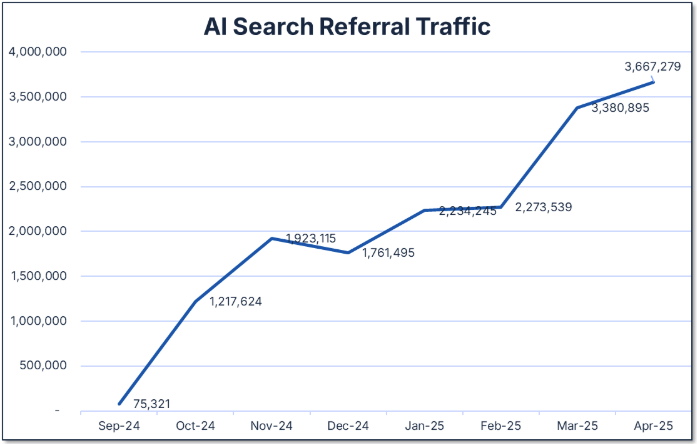
Despite the growth, AI traffic isn’t driving conversions
Despite the rapid growth, generative AI search platforms aren’t driving conversions (taking an action after visiting a site, such as making a purchase or signing up for a newsletter), according to data from BrightEdge. Organic search is still the primary driver for conversions. BrightEdge found that AI search accounts for less than 1% of referral traffic. Most of those referrals are coming from ChatGPT. Google wasn’t included in the survey.
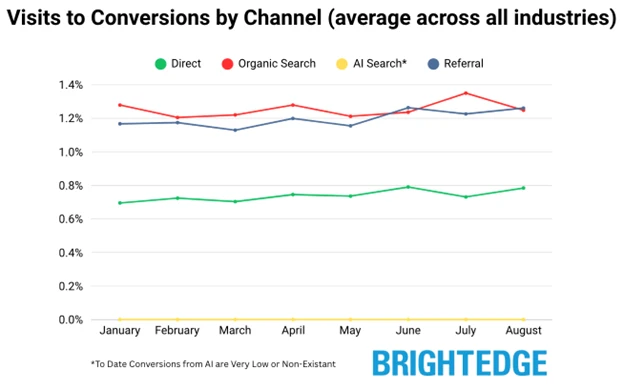
AI search serves as a research channel, with “near-zero” direct conversions tracked by BrightEdge, according to a report out last month. However, this means that AI search could be valuable for top-of-funnel discovery for publishers, who can convert audiences through direct channels.
Some publishers are maintaining visibility in AI search
Publishers are frequently cited in two major AI platforms (ChatGPT and Google AI Mode), in categories such as business and professional services, consumer electronics, fashion and apparel, and financial services, according to Semrush data.
This shows that these platforms prioritize editorial content as sources, and publishers are appearing in front of generative AI search users.
But the data also shows a significant difference in how generative AI platforms source information. For example, for business and professional services, ChatGPT mostly cites Reddit (141.2%) and Wikipedia (151.9%), with each referenced more than once per prompt on average. Industry-specific sources like TechRadar (29.83%) and Forbes (23.82%) also feature prominently.
Meanwhile, Google AI Mode mostly cites LinkedIn (24.1%), followed by Google’s own properties (21.9%) and Yelp (21.4%).
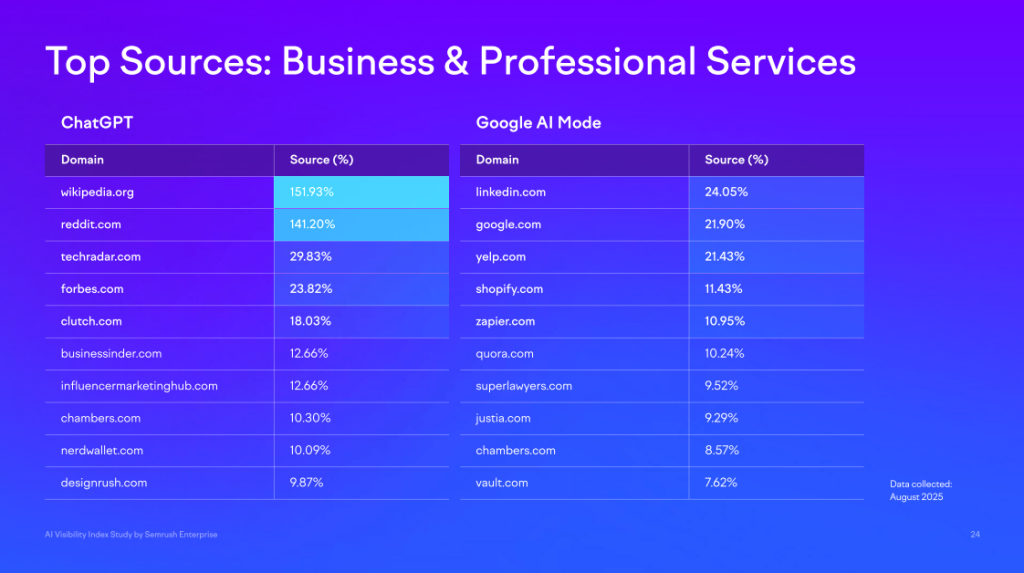
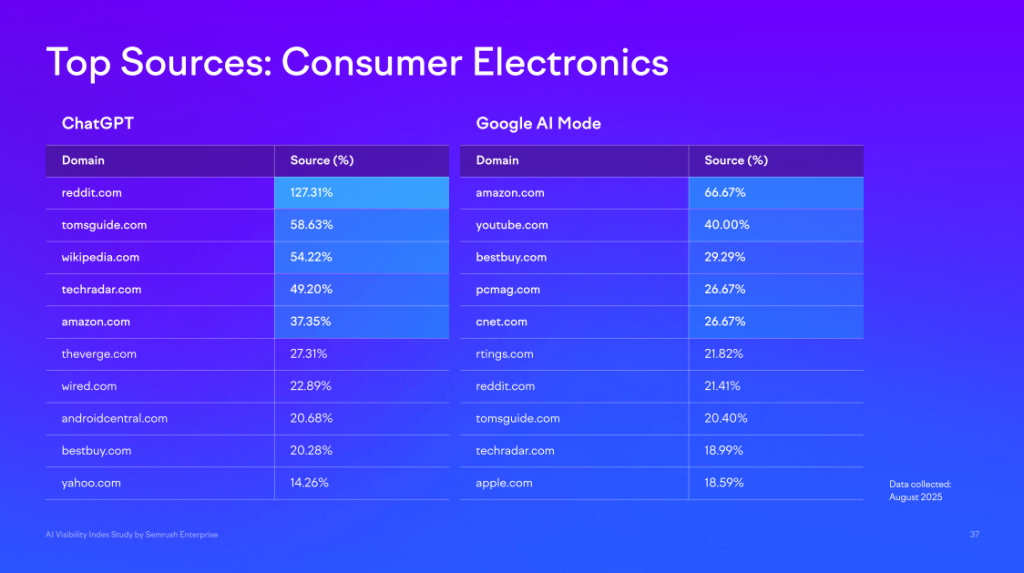
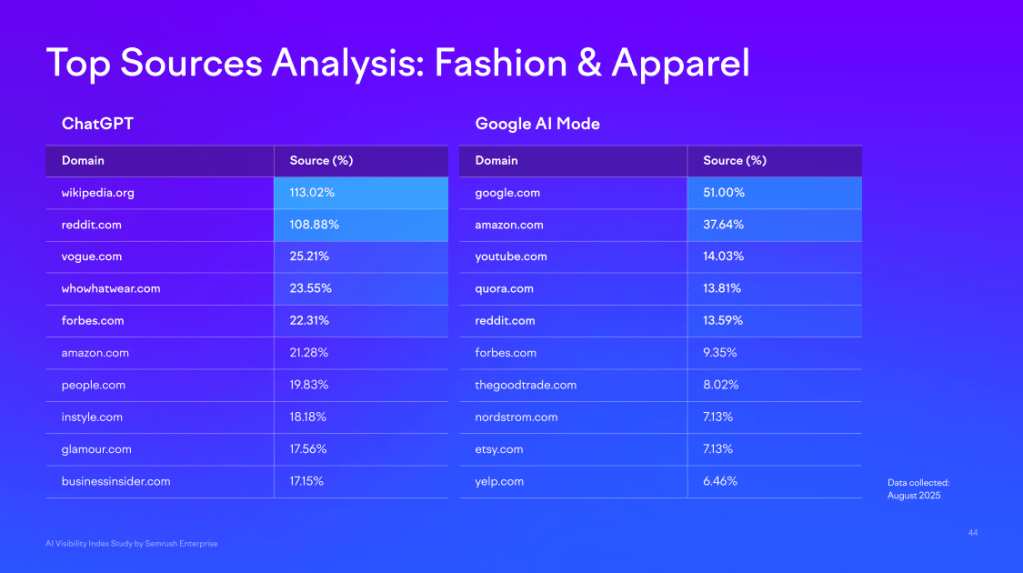
“Publishers play an important role in the authority of certain topics. AI has to rely on the authority of certain media outlets,” Levin said.
However, as the study shows, AI is more likely to pull information from user-generated content from sources like Reddit and YouTube. This explains, in part, why publishers are seeing less referral traffic overall, Levin said.
“As the mix of sources have changed, traditional media companies have gotten less traffic,” he said. “It’s a redistribution [of referral traffic] because of AI… Reddit gained more [traffic growth] than all of the media companies combined [in the report] have lost.”
More in Media

How creator talent agencies are evolving into multi-platform operators
The legacy agency model is being re-built from the ground up to better serve the maturing creator economy – here’s what that looks like.

Why more brands are rethinking influencer marketing with gamified micro-creator programs
Brands like Urban Outfitters and American Eagle are embracing a new, micro-creator-focused approach to influencer marketing. Why now?

WTF is pay per ‘demonstrated’ value in AI content licensing?
Publishers and tech companies are developing a “pay by demonstrated value” model in AI content licensing that ties compensation to usage.








